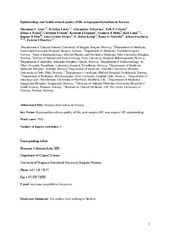Blar i forfatter "Lima, Kari"
-
Complement Activation in 22q11.2 Deletion Syndrome
Grinde, Dina; Aresvik, Dina Mikhailovna; Øverland, Torstein; Lima, Kari; Schjalm, Camilla; Mollnes, Tom Eirik; Abrahamsen, Tore G (Journal article; Tidsskriftartikkel; Peer reviewed, 2020-03-09)The 22q11.2 deletion syndrome (22q11.2 del), also known as DiGeorge syndrome, is a genetic disorder with an estimated incidence of 1:3000 to 1:6000 births. These patients may suffer from affection of many organ systems with cardiac malformations, immunodeficiency, hypoparathyroidism, autoimmunity, palate anomalies, and psychiatric disorders being the most frequent. The importance of the complement ... -
Epidemiology and health related quality of life in hypoparathyroidism in Norway
Astor, Marianne; Løvås, Kristian; Debowska, Aleksandra; Eriksen, Erik Fink; Evang, Johan Arild; Fossum, Jan Christian; Fougner, Kristian J; Holte, Synnøve E.; Lima, Kari; Moe, Ragnar Bekkhus; Myhre, Anne Grethe; Kemp, E. Helen; Nedrebø, Bjørn Gunnar; Svartberg, Johan; Husebye, Eystein Sverre (Journal article; Tidsskriftartikkel; Peer reviewed, 2016-05-17)<b>Objective:</b> The epidemiology of hypoparathyroidism (HP) is largely unknown. We aimed to determine prevalence, etiologies, health related quality of life (HRQOL) and treatment pattern of HP.<br> <b>Methods:</b> Patients with HP and 22q11 deletion syndrome (DiGeorge syndrome) were identified in electronic hospital registries. All identified patients were invited to participate in a survey. ... -
A longitudinal follow-up of autoimmune polyendocrine syndrome type 1
Bruserud, Øyvind; Oftedal, Bergithe Eikeland; Landegren, Nils; Erichsen, Martina Moter; Bratland, Eirik; Lima, Kari; Jørgensen, Anders Palmstrøm; Myhre, Anne Grethe; Svartberg, Johan; Fougner, Kristian J; Bakke, Åsne; Nedrebø, Bjørn Gunnar; Mella, Bjarne; Breivik, Lars Ertesvåg; Viken, Marte K; Knappskog, Per; Cuida Marthinussen, Ileana Mihaela; Løvås, Kristian; Kämpe, Olle; Wolff, Anette Susanne Bøe; Husebye, Eystein Sverre (Journal article; Tidsskriftartikkel; Peer reviewed, 2016-06-02)<b>Context:</b> Autoimmune polyendocrine syndrome type 1 (APS1) is a childhood-onset monogenic disease defined by the presence of two of the three major components: hypoparathyroidism, primary adrenocortical insuffi- ciency, and chronic mucocutaneous candidiasis (CMC). Information on longitudinal follow-up of APS1 is sparse. <b>Objective:</b> To describe the phenotypes of APS1 and correlate the ...


 English
English norsk
norsk

